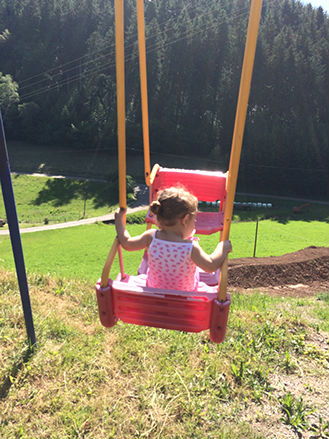Mourning over LEGO towers \ Adi Dwek Bonar
November 2014

It’s a quiet Sunday morning and we decided to spend it at home within our little family. Hubby is mainly trying to gain a few more hours of sleep, as if the week is one big giant ‘sleep monster’ which eats every bit of it while he is working relentlessly.
I, on the other hand, was trying to occupy my own ‘sleep monster’, which I like to call my daughter. Don’t get me wrong, I adore this precious creature, she just seems to like getting up at 8am on Sundays as well. And although I am half asleep and missing my pillow very much, there isn’t anything else I rather do but to sniff the sweet scent of this little one.
The living room floor is covered by a colourful rug made by all of her toys, scattered around by its own inner order, like we are trapped in sea of little animals, cubes and plastic dolls. And while all my senses are yelling inside that we NEED to start arranging everything in its boxes, she insists on building and destroying repetitively our perfect LEGO house. She doesn’t even wait a second to enjoy our good work, can’t be eager enough to take everything apart and start all over again.
I wish I was a bit like that, I think to myself. As I see it, the end is one hell of a scary place and even when it’s only symbolic – I still prefer to avoid it. But as I kept on watching her, accompanying her with my eyes every step of the way, I realized it has a rather tranquillizing effect.
While we were having lunch and I was telling my husband all he had missed this morning, I remembered a short paper by Freud I once read. Unlike all his other ‘theory and technique papers’, he writes there about his personal experience taking a walk in the countryside with a famous poet and a taciturn friend. Both of them were having a hard time enjoying the beautiful nature, due to its temporariness, or as Freud calls it – Transience. Unlike his walk partners, Freud begs to differ by saying that nature is eternal and what is destroyed by winter comes again next year in Spring (Freud, 1916).
Yes, I know it sounds a bit corny and in a way states the obvious. Maybe, that is the reason why most of us tend to be ‘winter blue’ and feel reborn once summer arrives again. But I believe there is a more profound meaning to it. I believe it has a lot to do with how we feel about loss, whether it is losing important people or even sentimental things.
The way we respond to loss indicates our personal history with our own loss. Some of us are the kind of people who will lose an important opportunity, grieve about it a few days or even a month but then – find another wonderful thing to inspire for. Others, will give up the whole idea completely and focus on not taking any big risks so not to be disappointed again. The way we all react to loss has nothing to do with what classical psychoanalysis defines as our character. It has to do with previous difficult experiences and how we overcome them (our personality).
So, am I the kind of person that can’t enjoy fresh flowers in my garden just because three months from now they won’t be around? Or more importantly – am I the kind of mother that teaches her daughter not to enjoy life and take any chances? If so, I am basically setting her up to a loveless and joyless life. Not really a light reading subject, I concur, and all because of an innocent LEGO game. But for a moment there I was quite anxious.
Freud (1916) argues, that when we love objects (someone or something) we invest an energy in it. To this capacity to love he calls Libido. If these objects are destroyed, or lost to us, our capacity to love is once more liberated to love again. But this process, as we all know, involves a lot of pain.
According to Freud the pain we feel is actually our own ego (self) that clings to this object and not letting go. If we gradually give the object up and go back to living our lives we completed a healthy process of Mourning. But if we keep on suffering until it becomes chronic and difficult to continue with our lives – this is something a bit more complicated. This state, which Freud names Melancholia, refers to us feeling ambivalent towards an object and then – losing it. This ambivalence, that includes both feelings of love and hate, leaves us no choice but taking some of these feeling in towards ourselves (internalizing) in order to solve this duality. As a result, we identify with the hatred towards this object and direct it to ourselves. In that way, we are freeing the guilt we feel and punishing ourselves for this hatred. From the outside (in the conscious level) we can only notice the love we had for this object (Freud, 1916). This is how we create very unhappy life for ourselves, filled with feelings of uselessness and sadness. From this point of view everything feels a bit pointless and tasteless.
Well, I guess that Freud had in mind a more radical state. Having that said, I want to suggest that this theory can still provide us with an interesting perspective on our everyday lives. As a mother to the cutest sleeping monster ever, I am her first love object and therefore – have crucial impact on the way she will respond to other objects around her and her future relationships. If I encourage her to freely explore her external (and internal) world, experience loss which she can reverse by playing with LEGO and even cry her eyes out just because there is a limited amount of pralines in the chocolate box – I equip her with an essential tool box for life.
March 2014
סוגיית התלות המוחלטת של התינוק בדמויות המטפלות בו, כפי שבאה לידי ביטוי בתאוריה הקלאסית של ד. וויניקוט, מסייעת לאמא אוהבת אחת לשמש קול וסנגור עבור הפעוטות אל מול כותרת סרקסטית ומכעיסה באינטרנט. תוך כך, היא מוצאת עצמה שוקעת במחשבות בנוגע להתמודדותה בחיי היום- יום עם ביתה הקטנה ועל האפקט ההשלכתי במערכת היחסים אם- תינוק.
info@2grow.eu
